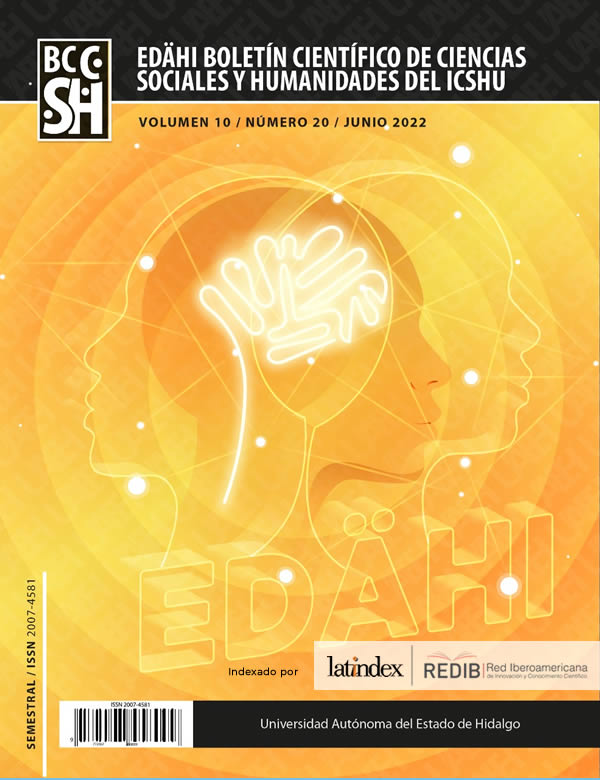Desafíos tecnológicos y pedagógicos que enfrentaron los docentes del idioma inglés durante la pandemia por la COVID-19
DOI:
https://doi.org/10.29057/icshu.v10i20.7927Keywords:
Technological challenges, pedagogical challenges, pandemic, remote teachingAbstract
The pandemic caused by SARS CoV 2 has modified the way we learn and teach in the last 18 months. In Mexico, where this study took place, as in any other countries, and as a response to the pandemic, teachers were forced to change their teaching methodology, and face to face classes turned into remote teaching. Some teachers were not prepared to face this new modality, and some challenges emerged. This is a qualitative study that reports the experience of three ELT teachers. Results reveal that these teachers faced two main challenges, technological and pedagogical.
Downloads
References
Adom, D., Yeboah, A. & Ankrah, A. (2016). Constructivism philosophical paradigm: Implication for research, teaching and learning. Global Journal of Arts and Social Sciences. 4(10), pp. 1-9. Retrieved from: https://www.eajournals.org/wp-content/uploads/Constructivism-Philosophical-Paradigm-Implication-for-Research-Teaching-and-Learning.pdf
Baxter, P. & Jack, S. (2008). Qualitative case study methodology: study design and implementation for novice researchers. The qualitative report, 13(4), pp. 544-559. Retrieved from http://www.nova.edu/ssss/QR/QR31-4/baxter.pdf
Bozkurt, A, & Sharma, R. (2020). Emergency remote teaching in a time of global crisis due to CoronaVirus pandemic. Asian Journal of Distance Education 15(1), i–vi. https://doi.org/10.5281/zenodo.3778083
Creswell, J. (2014). Research design: qualitative, quantitative, and mixed methods approaches (4th ed.). Sage.
Duncan, H. & Young, S. (2009). Online pedagogy and practice: Challenges and strategies. The Researcher, 22(1), 17-32, pp.18-23. Retrieved from: https://www.researchgate.net/publication/282662578
Ferri, F.; Grifoni, P. & Guzzo, T. (2020). Online Learning and Emergency Remote Teaching: Opportunities and Challenges in Emergency Situations. Journal Societies, 10(4), pp.1-18; Retrieved from https://doi.org/10.3390/soc10040086
Flores, B. & Trujillo, J. (2021). Los retos de la educación a distancia en las prácticas educativas durante la pandemia de COVID-19. Revista RedCA, 4(10), pp. 73-88; Retrieved from https://doi.org/10.36677/redca.v4i10.16558
Hodges, C., Moore, S., Lockee, B., Trust, T. & Bond, A. (2020). The difference between emergency remote teaching and online learning. EDUCAUSE review. Retrieved from: https://er.educause.edu/articles/2020/3/the-difference-between-emergency-remote-teaching-and-online-learning
Karkar-Esperat, Tala. (2018). International graduate students' challenges and learning experiences in online classes. Journal of international students, 8(4), pp. 1722-1735. Retrieved from https://doi.org/10.5281/zenodo.1468076
Medelyan, A. (2020). Coding Qualitative Data: How to Code Qualitative Research (Updated 2020). Insights: Thematic. Retrieved from https://getthematic.com/insights/coding-qualitative-data/
Roman, J. (2020). La educación superior en tiempos de pandemia: una visión desde dentro del proceso formativo. Revista Latinoamericana de Estudios Educativos RLEE, 50(especial), pp. 13-40. https://doi.org/10.48102/rlee.2020.50.ESPECIAL.95
Sadiku, Matthew, Adebo, Phillip, & Musa, Sarhan (2018). Online Teaching and Learning. International Journal of Advanced Research in Computer Science and Software Engineering, 8(2), pp. 73–75. https://doi.org/10.23956/ijarcsse.v8i2
Saminathan, V. (2020). Problems of Online Classes. International Journal of Academic Research Reflector.9 (6), pp.1-3. Retrieved from: https://www.researchgate.net/publication/348447927
Sánchez Mendiola, M., Martínez Hernández, A.M.P., Torres Carrasco, R., de Agüero Servín, M., Hernández Romo, A.K., Benavides Lara, M.A., Jaimes Vergara, C.A., & Rendón Cazales, V.J. (2020). Retos educativos durante la pandemia de COVID-19: una encuesta a profesores de la UNAM. Revista Digital Universitaria, 1-23.
Schunk, Rachel. & Lambert, Rachel. (2020). Am I doing enough? Special educators’ experiences with Emergency Remote Teaching. Education sciences, 10(11), pp. 1-15. Retrieved from https://www.mdpi.com/2227-7102/10/11/320
Shisley, S. (2020, May 20). Emergency Remote Learning Compared to Online Learning. Learning Solutions. Retrieved from https://learningsolutionsmag.com/articles/emergency-remote-learning-compared-to-online-learning
Toquero, Cathy. (2020). Emergency remote education experiment amid COVID-19 pandemic in learning institutions in the Philippines. International Journal of Educational Research and Innovation, 15, pp.162-176. https://doi.org/10.46661/ijeri.5113
Waldner, Leora., McGorry, Sue., & Windener, Murray. (2012). E-Services-Learning: The Evolution of Service-Learning to Engage a Growing Online Student Population. Education Outreach and Engagement, 16 (2). Available at: http://files.eric.ed.gov/fulltext/EJ975813.pdf
World Health Organization. (2020). IHR Emergency Committee on Novel Coronavirus (2019-nCoV). Retrieved from: https://www.who.int/director-general/speeches/detail/who-director-general-s-statement-on-ihr-emergency-committee-on-novel-coronavirus-(2019-ncov)
Yang, X. (2020). Teachers' perceptions of large-scale online teaching as an epidemic prevention and control strategy in China. SAGE, 1-6. https://doi:10.1177/2096531120922244




















